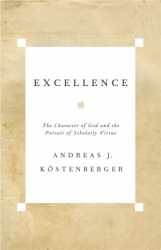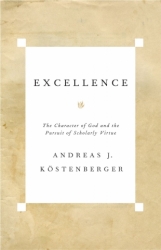How ought theology and doxology affect the work you do? You may not have thought of it, but Andreas Köstenberger has, and in his book Excellence: The Character of God and the Pursuit of Scholarly Virtue he tells us all about it. It’s an unusual book, one that I somehow hadn’t even noticed until last year, but I found it a fascinating read and a challenging exhortation. If you’re involved in scholarly work, this book is a must-read. And if you’re not, still much of it applies to how every Christian ought to pursue his or her work. Today Dr. Köstenberger is here to talk to us about it.
Books At a Glance:
First, tell us what your book is about. What is your thesis, and what contribution are you hoping to make?
Köstenberger:
My thesis is that God has called every person, and in particular every Christian, to pursue excellence. By “excellence” I mean essentially fulfilling the purpose for which God created us, to reach our God-given potential. Too often we find Christians doing a mediocre job. That doesn’t glorify God. While we’re saved by grace, and grace continues to be operative in our lives, the Bible also calls us to make every effort to pursue excellence.
Books At a Glance:
Your book is one of a kind – at least I am not aware of another like it. How did it come about? What concern(s) brought you to see the need for this book and to think along these lines?
Köstenberger:
Well, before I studied theology, and New Testament, I pursued a degree in economic and social sciences. I read Tom Peters’s classic In Pursuit of Excellence which explores the notion of excellence in the business world. Later, after becoming a Christian, I read Franky Schaeffer’s Addicted to Mediocrity, which is about Christians in the arts. Having become a Christian a bit later in life, I had been reared on the premise that whatever a person does, he or she should do with excellence, whether in one’s studies, playing an instrument, or doing one’s work. So when I became a Christian, I was surprised to find that all too often Christians were not marked by excellence in what they did. When I searched the Scriptures, I found confirmation that God has indeed called every person, and in particular every Christian, to excellence, and seeing that a work challenging believers to a greater pursuit of excellence did not yet exist, I set out to write such a book.
Books At a Glance:
You make the point that excellence is required for all Christians, not only those involved in scholarly endeavor. So, for the non-scholar, what is excellence in Christian living? And how does it differ from mediocrity?
Köstenberger:
In my book, I divide excellence into three areas: vocational, moral, and relational. It occurred to me that all too often we are lopsided and exhibit excellence in one or two of those areas but not in all three. The problem is, we must pursue excellence holistically, that is, in all three areas, if we don’t want to run the risk of falling short of becoming the well-rounded person God wants us to be. We simply can’t afford to choose to excel in the way we do our job (such as Rory McIlroy in golf or Roger Federer in tennis) but neglect pursuing excellence in the moral and relational realms. We should try to a good job at work (vocational excellence) and aspire to be a person of integrity (moral excellence) and a person that loves others (relational excellence).
Books At a Glance:
How is this related to the Protestant doctrine of Christian “vocation”?
Köstenberger:
Excellent question! In fact, the notion of excellence I have just described is perfectly congruous with the Protestant doctrine of Christian vocation. The fact is just that in our everyday lives, we’ve gotten so busy that many of us have settled for simply getting things done, doing an adequate job, rather than being more selective in what we take on and then doing those few things with excellence. That’s one of the things I challenge people in the book: to do few things well, rather than doing many things with mediocrity.
Books At a Glance:
How is God the ground of all excellence? And how does our creation in God’s image entail a demand for excellence in scholarship?
Köstenberger:
In the book, I spend an early chapter expounding one of the key passages in Scripture on the topic of excellence, 2 Peter 1:3-11, which reads:
3 His divine power has granted to us all things that pertain to life and godliness, through the knowledge of him who called us to his own glory and excellence, 4 by which he has granted to us his precious and very great promises, so that through them you may become partakers of the divine nature, having escaped from the corruption that is in the world because of sinful desire. 5 For this very reason, make every effort to supplement your faith with virtue, and virtue with knowledge, 6 and knowledge with self-control, and self-control with steadfastness, and steadfastness with godliness,7 and godliness with brotherly affection, and brotherly affection with love. 8 For if these qualities are yours and are increasing, they keep you from being ineffective or unfruitful in the knowledge of our Lord Jesus Christ. 9 For whoever lacks these qualities is so nearsighted that he is blind, having forgotten that he was cleansed from his former sins. 10 Therefore, brothers, be all the more diligent to confirm your calling and election, for if you practice these qualities you will never fall. 11 For in this way there will be richly provided for you an entrance into the eternal kingdom of our Lord and Savior Jesus Christ.
In this passage, Scripture provides us with the contours of a theology of excellence: God has called us to his own glory and excellence (v. 3) and so calls to make every effort to supplement our faith with virtue (v. 5), which is actually the same word in the original Greek as the word translated “excellence” in verse 3. Notice also that in verse 8 Peter says that if these qualities are ours, we’ll be neither ineffective nor unfruitful in our Christian lives. Because we’re created in God’s image, and because God is excellent, we, too, are called to mirror God’s excellence in our lives and relationships with one another, including those of us who are called to be scholars.
Books At a Glance:
How does the pursuit of holiness, for the believing scholar, entail the pursuit of excellence? And how is the pursuit of excellence related to our worship of God and our stewardship for God?
Köstenberger:
Probably the hardest to write, but perhaps most important chapters in the book were those on holiness and spirituality. It occurred to me that before discussing individual virtues such as diligence, courage, passion, restraint, and others, it would be important to set our entire pursuit of excellence within the framework of overall holiness which is to be true for every believer regardless of our specific calling, areas of giftedness, and personal circumstances. You’ll have to read the book to get the details (especially chapters 3 and 4), but in a nutshell, I describe the Christian pursuit of holiness as striving to become what we already are, namely set apart for God and his service, and to focus on being first, rather than immediately rushing on to doing.
Books At a Glance:
You speak of the Christian scholar as one who is “liberated” from a mindset of skepticism. This will strike some people as backwards, assuming that the skeptic is the “free” thinker. Could you explain what you mean here? How does this relate to a pursuit of truth within the “restraints” of submission to Scripture and the exclusivity of the gospel. And for that matter, what is the relation of faith and reason?
Köstenberger:
Well, those are some loaded questions, and hard to answer in just a few sentences. In fact, as you know, we’ve just recently written two books, Truth Matters and Truth in a Culture of Doubt, that flesh out at some length how this works. I firmly believe that it’s possible to be an intelligent person and to love God with all my mind without having to take a leap of faith that shuts down my reasonable, critical thinking. I don’t want to deny that there is a sense in which a leap of faith is necessary, a time when you have to choose to trust in what Jesus Christ has done for you on the cross and place your faith actively in him rather than in yourself and your ability to live a good, moral life. What I’m saying is that we have solid evidence for exercising such faith and even after we believe, we can continue to use our intellect to explore the many facets of life and also Scripture in a way that is both faithful and intellectually honest. As Jesus said: “If you remain in my word, you are truly my disciples, and you will know the truth, and the truth will set you free” (John 8:31-32).
Books At a Glance:
We will of course need to read your book to answer this last question, but can you suggest some ways that will help us move beyond our usual mediocrity (or worse!) to excellence? Your book points this out wonderfully in the various aspects of what is required of us. Perhaps you can describe for us how to begin? How should we first adjust our thinking?
Köstenberger:
I think many of us have gotten used to thinking the best we can hope for is just to get by. We scramble, and we struggle, whether it’s in keeping the house tidy, or in our parenting, or in the way we do our job. So the first step, I think, is for us to really embrace the truth that God wants us to rise above mediocrity and attain to a higher standard of actually striving to do everything we do well and to the glory of God. The next thing, then, may be for us to evaluate if we’re doing too much. We may need to take inventory and see if we need to cut things out of our lives, or delegate certain tasks to others. That may involve adjusting our standard of living and may involve a pay cut, but will most likely lead to an increase in closeness to God and others. Once we’re infused with the conviction that as believers in particular, God has called us to excellence in everything we do, we’ll be motivated to take the necessary steps to make this an increasing reality.
Now let me be clear: apart from the grace of God, the pursuit of excellence would surely become a crushing burden. No one can in their own strength live up to this expectation! But obviously, God doesn’t expect us to pursue excellence in a self-reliant manner. As 2 Peter 1:3 tells us, he’s already given us everything we need to pursue excellence and a set of Christian virtues, through introducing us to a vibrant, life-giving relationship with the Lord Jesus Christ. He’s the ground of true excellence.


